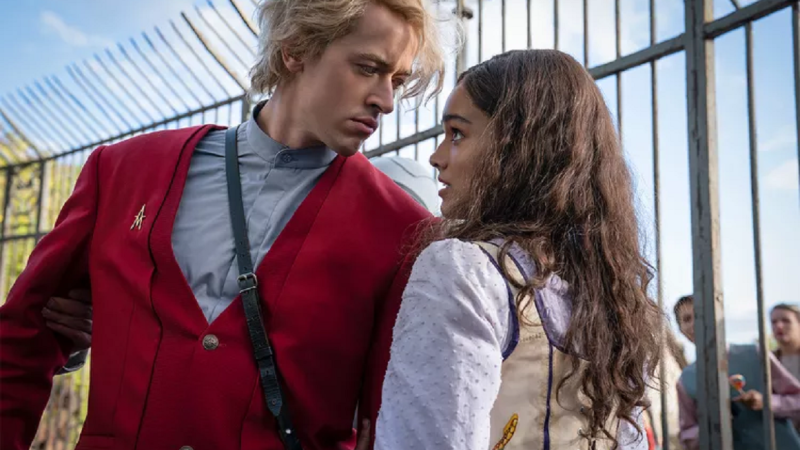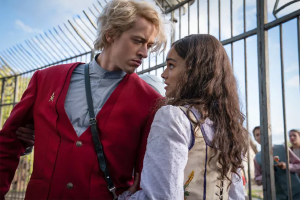

My wife and I recently watched The Ballad of Songbirds and Snakes, the film version of Suzanne Collins' prequel to her famous Hunger Games trilogy. It was really impressive, even more so than I expected. If you liked the original trilogy and/or the films based on it (starring Jennifer Lawrence as Katniss Everdeen), you will love this movie.
The original trilogy is set in a world where what's left of the former United States is ruled by a tyrannical central government (the "Capitol") that oppresses and exploits twelve subordinate districts. Every year, each district must send two children (known as "tributes") to participate in the Hunger Games, a nationally televised game show where they fight each other to the death until only one (the "Victor") survives. The government uses the Games to entertain the public and divert their attention away from its oppressive nature, while also reminding the districts that any attempt at rebellion is doomed to failure.
The prequel is set in the early days of the Hunger Games, soon after the Capitol suppressed a bloody rebellion by the districts. The main character is a young Coriolanus Snow—the future Capitol President who is the primary antagonist in the original trilogy. At the start of the prequel, Snow is an ambitious student from a prominent Capitol family that has fallen on hard times. He becomes a "mentor" to one of the tributes, responsible for helping her in the Games and promoting her to the viewing public.
The big challenge for both the movie and the book is that this is the origin story of a villain Thus, it's hard for Suzanne Collins and the film screenwriters to make audiences empathize with the main character. But they pull it off brilliantly.
They succeed so well that I actually found it easier to empathize with Snow than with Katniss Everdeen in the original trilogy. Very few of us have Katniss's selfless heroism. On the other hand, many people face difficult tradeoffs between doing what is right and seeking power, prestige, and comfort—the kinds of choices Snow faces. We often have strong impulses in both directions, as Snow does. Viewers can see themselves in Snow. Most of us are more like him than like Katniss. Snow is not simply an out-and-out amoral villain (at least he doesn't start out that way or quickly become it). He struggles with the tradeoffs, and so do many of us.
These kinds of challenges are most obvious for ambitious people living under oppressive authoritarian regimes, like Snow under the Capitol. As Snow finds out, it's almost impossible to attain power and prestige in such a system without perpetrating evil. But these challenges come up in liberal democracies, as well. Think, for example, of the various conservative opinion leaders, activists, and politicians who have had to choose between maintaining their principles and getting ahead in the conservative movement in the Trump era.
The film and book also do a good job of showing the origins of the authoritarian Capitol regime, and why people in the Capitol see the world as they do. More than the original trilogy, The Ballad of Songbirds and Snakes gives us a window into the Capitol's ideology, which emerges as a kind of authoritarianism emphasizing security and order. In part because of the trauma of the earlier war, Capitol citizens simultaneously despise and fear the people of the districts. That makes it easier for them to accept something like the Hunger Games, especially once the Games become more exciting and entertaining (a process depicted in the prequel).
In addition to Snow, the other major characters are also compelling. Rachel Zegler effectively depicts the charismatic District 12 tribute Lucy Gray Baird, who wins over the Capitol audience and—for a time—inspires Snow to be a better person. There are obvious parallels between Lucy and Katniss Everdeen in the original trilogy. Both are District 12 tributes who become highly popular and pose a potential threat to the Capitol. But, while Katniss is an introvert and a highly skilled fighter, Lucy (who has little combat ability) is an extrovert and talented performer. The prequel implicitly compares the two in interesting ways.
Dr. Volumnia Gaul, well-played by Viola Davis, is a compelling cross between Hobbes and Dr. Mengele. Her worldview becomes a kind of foundation for the Capitol's ideology: people are naturally aggressive and violent, and therefore must be ruled by a strong hand. The actors playing other major characters also do a great job, including Peter Dinklage as Dean Casca Highbottom, the apparent inventor of the Games. Dinklage is most famous for playing Tyrion on Game of Thrones. But he played this very different character so well, that I never once thought of him as Tyrion while watching this movie.
In sum, if you like the Hunger Games world at all and/or science fiction generally, you should check out this movie.
For those interested, I reviewed previous Hunger Games movies here, here, and here. I have also written about political themes in the original trilogy (see here, here, and here).
The post Review of "The Ballad of Songbirds and Snakes" appeared first on Reason.com.



.png?w=600)



